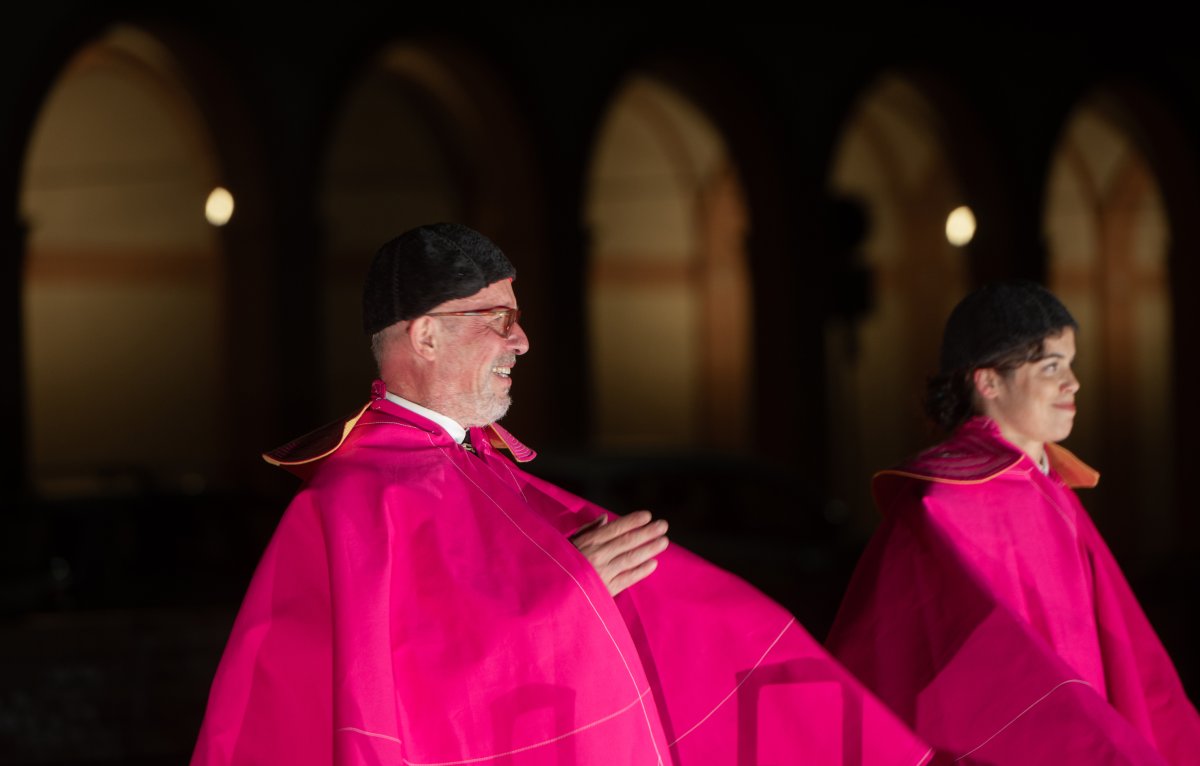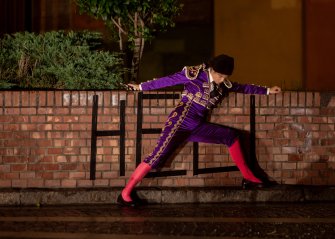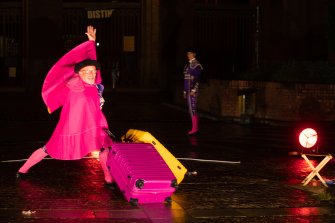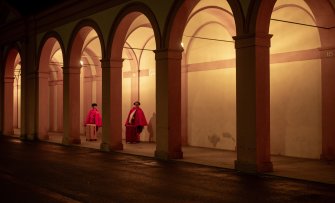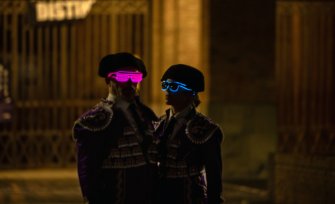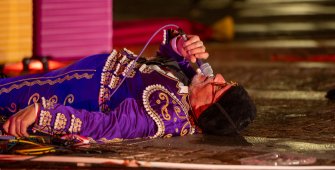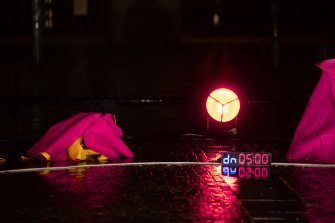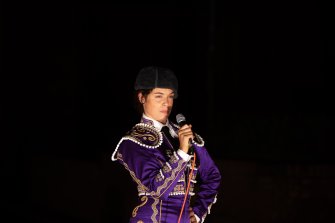El Adaptador
Marco Berrettini /* MELK PROD
Giovedi 12 settembre 2024 Xing ha presentato in prima italiana El Adaptador, una performance di Marco Berrettini. L’appuntamento era un Hole che si è localizzato in Piazza della Pace a Bologna, di fronte allo stadio Dall'Ara.
ll coreografo Marco Berrettini e la danzatrice Nastassja Tanner hanno opinioni differenti - anche molto differenti - su parecchi argomenti, forse anche perché appartengono a generazioni diverse. Tutto questo è al servizio di una performance che cerca uno stato di crisi, di tensione, simile alla corrida.Se il coreografo trae ispirazione da questa tradizione sempre più controversa, la sua intuizione nasce soprattutto dai cambiamenti che osserva come uomo bianco cis** etero nella nostra cultura e nella nostra società occidentale che non capisce, che non capisce più. Di fronte alle contraddizioni delle relazioni umane contemporanee, come esorcizzare tutta la rabbia di un eterno disadattato che è diventato improvvisamente un frustrato boomer? Il duo Berrettini & Tanner cerca, attraverso la danza, la musica, canzoni di un cinismo disperato e scene che si dissolvono nel nulla di fatto, di oltrepassare questo crinale, questo confine tra due tempi, due forze opposte. Un modo di esorcizzare con umorismo e derisione le nuove stereotipazioni. Probabilmente scopriremo danze vegane che faranno guerra alle danze carnivore, alcuni testi dovranno – senza dubbio – essere censurati dal piglio della cancel culture, altri rasenteranno l’appropriazione culturale, e questo contro ogni previsione.
“Quando ero un bambino e circolavano le barzellette su ebrei, italiani, americani, turchi e tedeschi non pensavamo che alterassero il nostro senso comune. Come dice il filosofo Jiddu Krishnamurti: “L’osservatore è l’osservato”. Ciò presuppone che siamo sia quelli che si prendono gioco degli altri, sia quelli che ne sono oggetto a loro volta. Certo, il razzismo esisteva, ma stranamente sapevamo distinguerlo, perché il razzismo non aveva umorismo. Ed è così che sono cresciuto, con l’idea che senza umorismo qualsiasi argomento presto appariva sospetto. Oggi non si parla più di scherzi. È tutto il comportamento umano che viene messo in discussione. El Adaptador corrisponde al desiderio di materializzare le osservazioni che ho potuto fare negli ultimi anni. Ho osservato cambiamenti anche nel mondo della danza, in particolare nel modo in cui si giudicano i lavori, non solo in base all’estetica ma anche nei rapporti tra le persone e infine attraverso gli assi tematici e ideologici attualmente considerati legittimi nel mondo dello spettacolo dal vivo. Questi cambiamenti non sono specifici del mondo della danza, si stanno verificando più in generale anche nella nostra cultura e società occidentale. È una rete vasta dove una nuova morale, una certa isteria senza precedenti, generano contraddizioni particolarmente violente, creando nodi sempre più tenaci e difficili da sciogliere. Questo ha gradualmente creato in me una frustrazione, che esorcizzo in El Adaptador.” (Marco Berrettini)
El Adaptador si ispira all'immagine del Matador. Spiega Marco Berrettini: “Ho la sensazione che il Matador, soggetto centrale della Corrida con il toro sacrificato, illustri bene l'idea di contraddizione che punteggia il mio progetto. Il Matador, simbolo dell'eroe, è da diversi anni oggetto di forti critiche: sempre più voci si levano per denunciare questo spettacolo ancestrale che ricorda i giochi romani del Colosseo. Onoriamo il coraggio del Matador mentre deploriamo l'inevitabile sacrificio del toro. Sono molte le persone che trovano nella Corrida una profonda bellezza, ma la cui crudeltà è sempre più scioccante. Ciò che mi preoccupa di questo fronte anti-corrida è che consumiamo ogni giorno milioni di animali allevati in condizioni terribili senza che la maggioranza chieda un boicottaggio. D'altra parte, la lotta del Matador con il toro e il massacro in cui si conclude lo spettacolo sono diventati un'immagine insopportabile. Come se il confronto con la realtà fosse molto più doloroso della consapevolezza del massacro di milioni di polli, maiali, bovini e altri animali dediti al consumo, e che avviene nella perfetta invisibilità delle campagne, mentre l'arena si trova proprio nel il centro di una città. Come opera il nostro spirito di censura? E come affronta il Matador queste crescenti critiche? Sarebbe pronto ad abbandonare questa tradizione profondamente radicata nella cultura spagnola a favore del modernismo dell’ideologia ‘woke’ verso le ingiustizie sociali?”
El Adaptador
coreografia Marco Berrettini in collaborazione con Nastassja Tanner
performers Marco Berrettini, Nastassja Tanner
musiche Marco Berrettini, Milena Keller, in collaborazione con Samuel Pajand
costumi e accessori Severine Besson
scena *Melk Prod.
luci Bruno Faucher
produzione *Melk Prod.
coproduzione Arsenic Centre d’art scénique contemporain Lausanne, Grütli – Centre de production et de diffusion des Arts Vivants Genève
col sostegno di Loterie Romande, Fondation Ernst Göhner, Città e Cantone di Ginevra, Pro Helvetia, the Swiss Foundation for Culture
***
Thursday 12 September 2024 Xing presented El Adaptador, a performance by Marco Berrettini. The event was a new Hole located in Bologna in Piazza della Pace, in front of the tower of the football stadium, and was part of the programme of Bologna Estate 2024.
The choreographer Marco Berrettini and the performer Nastassja Tanner are from different generations. On many subjects, they have different, even very different, opinions. Those differences are in service of a play that seeks a state of crisis, of tension, similar to a show of corrida. While the choreographer draws inspiration from this increasingly controversial tradition, his intuition stems above all from the changes he observes as a cis white straight man in our Western cultures and societies. Which he doesn’t understand, or no longer understands. Faced with the contradictions of contemporary human relationships, how do you exorcise the anger of a perpetual misfit who became a confused boomer? The duo Berrettini & Tanner looks at new stereotypes with humor. They use dance, music, songs of desperate cynicism and scenes that dissolve into nothingness, to find ways of crossing this threshold, on the edge between two eras and between two opposing forces. We’re likely to discover vegan dances that will wage war on carnivorous dances. Some texts will – without a doubt – be censored, while others will be bordering on cultural appropriation. And all of it, against all odds.
"When I was a child, we made jokes about Jews, Italians, Americans, Turks, Germans... we didn't feel like it would alter our common sense, our respect for others, because as the philosopher Jiddu Krishnamurti says: “The observer is the observed”. This presumes that we are at the same time those who make fun of others and those who will be fooled in turn. Of course, racism existed, but strangely, we knew how to distinguish it, because racism had no humor. And that's how I grew up, with the idea that without humor, any subject could quickly appear suspect to me. Today, there are no more jokes. It is all human behavior that is called into question. The choreographic project El Adaptador corresponds to the desire to materialize observations that I have been able to make in recent years. I have observed changes in the dance milieu in particular, particularly in the way pieces are judged, aesthetics, but also in the relationships between people, and finally through the thematic and ideological axes currently considered as legitimate in live performance. These changes are not unique to the dance world, they are also happening more generally in our Western culture and society. It is a vast net where a new morality, of an unprecedented hysteria, generates particularly violent contradictions, creating increasingly tight knots. This gradually created a frustration in me, which I exorcise with El Adaptador.” (Marco Berrettini)
El Adaptador is inspired by the image of the Matador. Marco Berrettini explains: "I have the feeling that the Matador, central subject of the Corrida with the sacrificed bull, illustrates well the idea of contradiction that punctuates my project. The Matador, symbol of the hero, has been strongly criticized for several years: an increasing number of voices are rising to denounce this ancestral spectacle which recalls the Roman games at the Colosseum. We honor the bravery of the Matador while deploring the inevitable sacrifice of the bull. There are many who find a deep beauty in the Corrida, but whose cruelty strikes more and more. What concerns me in this anti-Corrida front is that we consume millions of animals raised daily in appalling conditions without the majority calling for a boycott. By contrast, the Matador's fight with the bull and the bloodbath in which the show ends has become an unbearable image. As if the confrontation with reality were much more painful than the awareness of the massacre of millions of chickens, pigs, oxen and other animals destined for consumption, and which takes place in the perfect invisibility of the countryside, while the arena is located in the middle of a city. How does our mind of censorship operate? And how does the Matador live with these growing criticisms? Would he be ready to abandon this tradition deeply inscribed in Spanish culture in favor of a 'woke' modernism?"
El Adaptador
choreography Marco Berrettini in collaboration with Nastassja Tanner
performers Marco Berrettini, Nastassja Tanner
music Marco Berrettini, Milena Keller, in collaboration with Samuel Pajand
costumes and accessories Severine Besson
scenography *Melk Prod.
lights Bruno Faucher
production *Melk Prod.
coproduction Arsenic Centre d’art scénique contemporain Lausanne, Grütli – Centre de production et de diffusion des Arts Vivants Genève
supports Loterie Romande, Fondation Ernst Göhner, City of Geneva, Canton of Geneva, Pro Helvetia, Swiss Foundation for Culture

